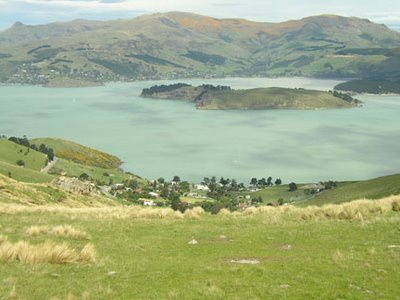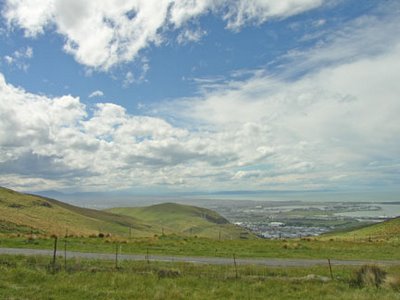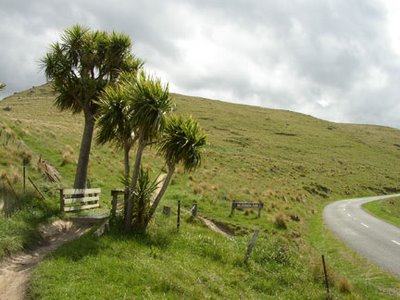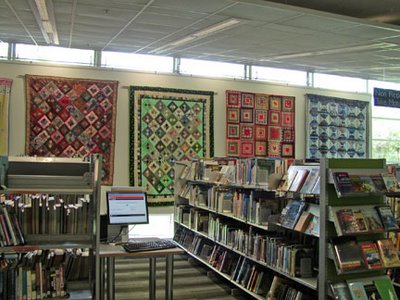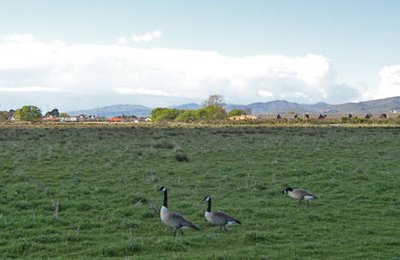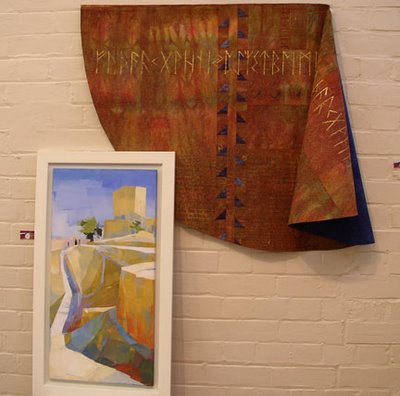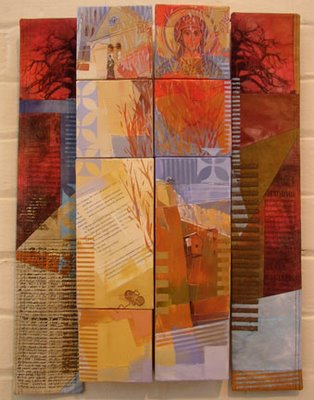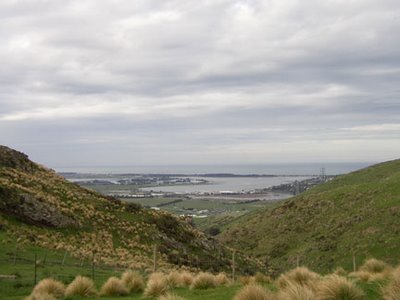If I could stop time, just once, I would choose to do it next year on our planned trip to Scotland. That way, we could fit in everything I want to see and do, and still get back within the four weeks that is the most leave I am able to take from work. But of course it wouldn't work, really, as you can see in this piece of fiction (disclaimer: unedited, first draft)...
*************************************I am talking to my eccentric neighbour, who has made one of his rare excursions out of his back shed to collect his mail from the letterbox. Most days, I hear banging and whining of power tools in the shed. Delivery men bring mysterious shaped packages quite often. Once I saw the shed shimmer strangely and start to fade, then I blinked and it appeared again. I thought I was imagining things.
Today I am asking him if he can clear our letterbox of junk mail while we are away. "If only I could stop time," I say, "I'd be able to see everything I want. Four weeks just isn't enough."
A strange look appears on his face. "Maybe I can help you there. Can you keep a secret?". He invites me to his shed where he produces two strange-looking belts.
"I need someone to test these for me", he says. "You can stop time with these, but I warn you, they take a lot of power. I've only been able to store enough charge in each to do it once. When you have turned them on, you have to keep them turned on, they won't work a second time. And please keep careful records of what happened, so you can report back to me."
Naturally I am doubtful, but it won't hurt to try, will it? If nothing happens, there's no harm done. After all, I've just asked a favour of him, so we will try out his weird invention, collect our mail when we get back and tell him it didn't work.
We reach Edinburgh and check into our bed and breakfast. "Shall we try them?" Paul# asks. "No, wait till we get to the castle", I suggest. So we leave our rental car parked in the garage, and catch a bus to the castle (parking is difficult in Edinburgh, we have been told). We look at each other. "Now?" "OK". We each push the right hand button, and everything freezes. The flag fluttering in the wind is as still as if it were a photograph. I notice a small girl with an ice cream. It is falling from her cone and sits in midair between the cone and the pavement. There is a line of tourists at the ticket booth. We start to push past them. "We should pay" I say. "No, we bought Heritage passes, remember?"
Inside the castle I wonder where to go next. "Audio guides" - I point out. We try one, but of course it doesn't play. Time is frozen. Instead we take a brochure, and explore the castle. Where next? "The Museum of Scotland" says Paul. All the buses are frozen, so we walk. When we get there, there is a problem. Automatic doors. They won't open. We look around the side and back of the building. There are staff entrances, but they have electronic key pads to open them, and we don't have the combination. Then I spot an open door, with a middle-aged man halfway through it. "Excuse me" we say, squeezing past him. He rocks and almost falls over. "Sorry", says Paul, and sets him back on his feet. The museum too has audio guides. No use to us. I can't find any brochures, we will have to manage the best we can. At least there is a plan of the layout. We start on the first floor: "Prehistoric Scotland". Another automatic door, but there are people walking through and we can enter. There are traditional displays, of course, but this museum is a modern one, and there are videos, all frozen in time. We see what we can and make our way to the next section. The door to this section is closed, and we can't get through at all. We have to move on.
After we have seen what we can in the museum, I realise my feet are aching and I'm starving. We walk out into the street and look for a restaurant. At the first, there is a tempting menu on the display board. But the food is all cooked to order, and there is no-one to order from. They are all statues. Eventually we find a cafe with a selection of sandwiches and muffins. We eat, and leave money at the counter. We continue our sight seeing. But we are getting tired and it's a long walk back to the bed and breakfast.
"We can sleep anywhere we like", says Paul. "The best hotels...nobody will ever know, we can walk in and out in an instant." There is a likely looking hotel just down the street. People are queued at the desk with suitcases, they appear to be checking out.
"Excuse me," says Paul, as he takes a key from the hand of the man at the front of the queue. "Room 626" he says to me. When we find the room, the sheets are rumpled, of course, but we straighten the bed and lie down exhausted. We wake some time later - no time later, really, from a sound sleep. I am hot and sweaty, and head for the shower. I turn on the taps, but nothing happens. The water is frozen in time, too.
"I can put up with your sweat, if you can put up with mine", Paul says.
"The hotel pool", I suggest.
"Good idea."
We swim naked, towel ourselves off and replace our somewhat crumpled clothes.
"We'll need more clothes", I say. We head off and find a chain store, where we buy cheap underwear and T-shirts, leaving the money on the counter with the price tags from the clothes. We buy books from a nearby bookstore, and look at souvenirs. But the tills won't open. We can't get change, and I am running low on all but large-denomination notes. And I can't bring myself to steal. We have to economize.
Still, we manage to see a good deal of Edinburgh. What a shame that our digital cameras won't work. It may take only an instant to process a photo, but it is still time. And time has stopped. As for the research I planned to do, everything at the National Archives has been computerised. and the computers won't work, either. After three more sleeps (I would say three days, but time has stopped), we have seen all that we can see. We make the long trudge back to our bed and breakfast.
"Where next?" Paul asks.
"Dundee," I say. We pack the suitcases into our rental car, sit down and do up our seatbelts. Paul turns the key in the ignition. Nothing. We look at each other.
"The petrol won't burn, frozen in time" he says.
"Bicycles?" I suggest.
"Roller skates?" counters Paul.
We sigh. It's a long, long way to Dundee on foot. Simultaneously, our hands reach for the "off" button on our belts.
*******************************# Not his real name. This is fiction, remember?
We were also asked this week, what superpower (other than freezing time) we would choose, if we could have one. I'd like to be able to fly round the world in an instant, like Superman. Then it wouldn't matter that I can only get away for four weeks. I could flit off to Scotland (or Paris, or the Great Wall of China, or Egypt, Spain , Morocco, Peru) for a day here or there, any time I want.
More Sunday Scribblings
here.


